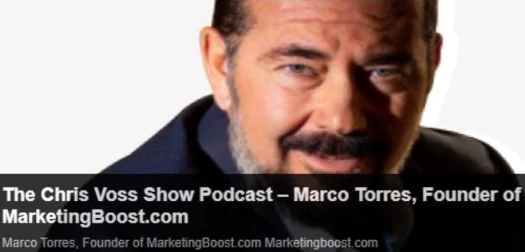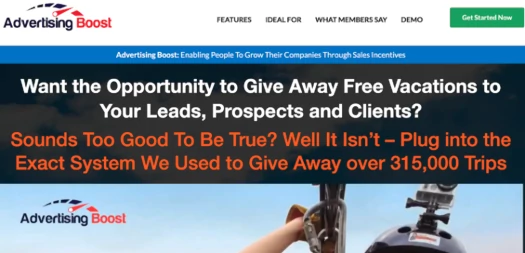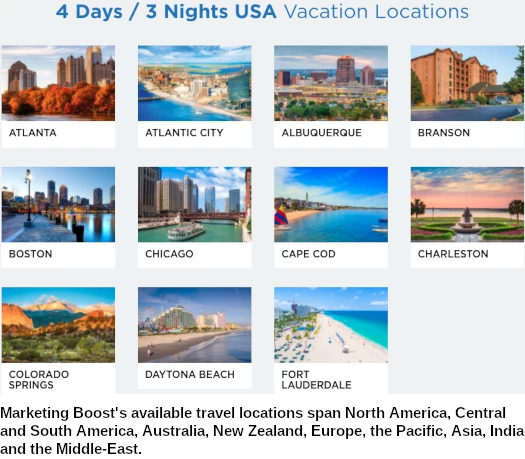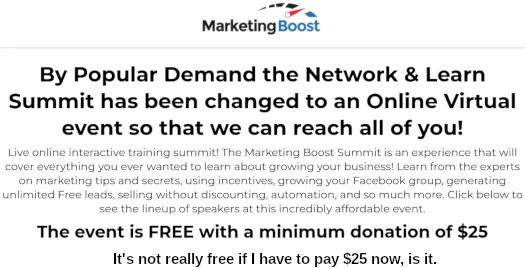Marketing Boost Review: Free vacations as a marketing tool?
 Marketing Boost provides no information about who owns or runs the company.
Marketing Boost provides no information about who owns or runs the company.
To get that information you need to click off-site to Marketing Boost’s webinars. There it’s revealed Marco Torres is Marketing Boost’s founder.

On one of Torres’ many FaceBook profiles, we additionally learn Marketing Boost launched in 2017.

The company is tied to Digital Experts LLC.
According to another of Torres’ profiles, he’s based out of Florida. There is a Digital Experts LLC incorporated in Florida, which I’m assuming is one and the same company.
Advertising Boost appears to be a clone launch of Marketing Boost:

Not sure what the story is there but Advertising Boost doesn’t exist anymore. A visit to Advertising Boost’s website domain redirects to Marketing Boost.
Advertising Boost’s website domain registration was last updated on January 31st, 2022.
While he does have a marketing history, I wasn’t able to pin down whether Torres has an MLM history.
Read on for a full review of Marketing Boost’s MLM opportunity.
Marketing Boost’s Products
Marketing Boost markets a platform that bundles vacations to client sales offers.
No matter what kinds of products or services you sell, NOTHING seduces a fence-sitter like throwing in a free vacation when they say YES to your offer, upsell, or referral request.
Your products and services become irresistible when your prospects start picturing themselves relaxing on a sun-soaked beach… gazing at the endless neon of the Vegas Strip… or sampling local cuisine at a picturesque Mexican plaza – all on someone else’s dime.
And being able to provide your new buyers with fantastic vacations feels great too… especially since it’s not YOUR dime. (It’s ours.)
Once you welcome your new client or customer on board, you’ll set them up to receive a certificate to redeem their vacation package. They’ll then have 7 days to activate their certificates.
Once activated, the certificates are valid for 18 months, and certificate holders can book and travel any time within that timeframe.
Marketing Boost claims use of their platform will “instantly Boost Sales by 60% or More”.

Access to Marketing Boost’s platform costs $197 a month.
Marketing Boost’s Compensation Plan
Marketing Boost affiliates are paid on $37 marketing platform subscription sales.
These sales can be made to both retail and recruited affiliate subscribers.
Marketing Boost pays commissions down two levels of recruitment (unilevel):
- 40% on level 1 (personal sales)
- 10% on level 2 (sales made by those you personally recruit)
Car Bonus
When a Marketing Boost affiliate generates 200 active marketing platform subscribers, they qualify for a Car Bonus.
The Car Bonus pays $500 a month towards a “dream car lease”.
If a Marketing Boost affiliate generates and maintains 400 active marketing platform subscribers, the Car Bonus is raised to $1000 a month.
Joining Marketing Boost
Marketing Boost affiliate membership appears to be free.
Marketing Boost Conclusion
$197 a month is for access to Marketing Boost’s platform – this begs the question, who’s paying for all these vacations?
This question is addressed on Marketing Boost’s website:
So if I don’t pay for these trips, who does?
We do.
We work closely with industry insiders who have information not available to the public about unsold premium accommodations at must-see destinations in the U.S. and beyond.
We work with providers to secure these unsold rooms as exceptionally low prices.
Why? Because property owners know they can recoup their costs with in-house dining and room service, casino earnings, spa services, valet parking, and other add-ons.
That’s income they can’t earn if a room is sitting empty. So they’re happy to practically give away their unsold rooms just to bring in revenue!
Are they though?
There are costs to maintaining a room that’s occupied. If these accommodation providers don’t recoup on other costs, they’re potentially losing more money over letting the room go vacant.
Marketing Boost’s website doesn’t mention any strings attached to the vacation stays.
One thing to keep in mind is the vouchers are only for accomodation. Everything else, including flights, must be paid for by the client.
Marketing Boost don’t represent otherwise, I’m just pointing it out because it’s natural to see “vacation” and think everything is covered.

While I’m inclined to question the validity of Marketing Boost’s pitch, they do seem to stand by their offer.
Try Marketing Boost for yourself today – if you don’t agree that this is the easiest, most effective way to get more YESes and maximize your income, just let us know within the first 30 days and we’ll happily refund your entire investment.
If the vacations are a disaster, that’s going to reflect poorly on businesses using Market Boost.
I can’t see that lasting so I’m inclined to take Marketing Boost’s offer at face value.
One potential danger in Marketing Boost is if the platform is used to promote itself.
For their part Marketing Boost state;
The platform is about helping you make more sales and grow customer and employee loyalty – it’s NOT a standalone business opportunity.
Unless it’s explicitly forbidden, I don’t see why someone can’t market free vacations to sell Marketing Boost itself.
What’s the difference if I attach Marketing Boost to a third-party or itself as an income opportunity?
This of course would open up the prospect of Marketing Boost operating as a pyramid scheme (i.e. the majority of subscribers are also affiliates).

I didn’t notice this overtly happening, but there sure are some wonky Marketing Boost income claims out there:

Fun fact, the above video was shot in 2020. At the time Caujuan Mayo claimed to be one of Marketing Boost’s “top affiliates”.
The link he provides in the video today redirects to some crypto scheme.
I get the impression Marketing Boost might be viable if attached to a “traditional” business. Although I question the long-term sustainability.
Beware of shysters using Marketing Boost as a tool to push questionable MLM opps.


Oz you may have missed the most interesting and shady part of the Marketing Boost offer. When a member issues a Free vacation voucher, the recipient has to pay “taxes” of around $30 per night in advance.
So if you receive a Free 7-day vacation voucher, you need to pay $210 to a third party company when you book your vacation.
And you must do it before your voucher expires in 30-days after the issue date, although you apparently can book ahead for anytime in the next 12-18 months.
In most USA/Mexico locations, you also have to fork out resort fees.
* Las Vegas resort fees run from $16.00 to $38.00 per night depending on hotel and season.
* Orlando, Fl resort fees run from $5.00 to $12.00 per night depending on hotel and season.
* Mexico resort fees run from $10.00 to $16.00 per night
* Thailand – No resort fees
* Spain – No resort fees
So your FREE 7-day vacation in Las Vegas will cost you $30 per night in taxes plus, let’s say, $25 per night in resort fees.
Total tax and fees to be paid in advance before you step on the plane = $385 USD
I reckon MB makes their money here, where a substantial number of people will pay the “tax and fees” before the 30-day voucher expiry date but never actually get around to going on the vacation!
Note: The fees, terms and conditions may have changed slightly since I was an affiliate last year.
I didn’t see anything about taxes, it’s not mentioned. “Free vacations” is the marketing pitch.
Who pays taxes to a third-party anyway? As you said sounds like fees in disguise, which would explain the funding model.
Mystery solved looks like.
Yes! So when you receive a vacation voucher, it has a unique code. But when you go to ‘activate’ it, you are booking via another third party travel website.
I can’t seem to locate the name of that site as I canceled my membership last year and no longer have access.
So it would appear that MarketingBoost are perhaps affiliates of another travel company!
Bit wonky to call them taxes and not be upfront about them then.
While some related taxes might be paid, they sound an awful lot more like hidden fees.
And not disclosing these fees to consumers is definitely a violation of the FTC Act.
Let’s clear this up! They say complimentary vacations because they are NOT going to pay the VAT taxes for you!
MB makes their money from subscriptions and idk, maybe some worked-out deal btwn the hotels but I do know 98% of their overall profits come from the actually mother company BookVIP.com – MB is just a small extra cash flow sector.
I’ve used 4 of the vacations myself (you can finesse it with friends) and resort fee/taxes are included in one.
It’s not ” hey purchase the taxes per night first” then boom when you go to book ” oh pay for resorts fee now too” SMH They only little caveat is that some weekends may cost extra around holidays or high seasons.
I had my friends stay in the Hyatt Palm Springs for 4 days/3 Nights for $280 all together (including the extra weekend tax b/c of a festival going on). That suite was $220+ tax per night on expedia.
As far as the referral compensation; I don’t really see a difference btwn almost any other company: health insurance, life insurance, real estate groups, all give commissions to bring more agents on.
I could care less about that though. Didn’t even consider it because of how low -ticket the opportunity is.
To touch on the business side of things hahah oh man, between the dining vouchers and vacations, my book bundle brand has racked in 1.3M in sales just from incentivizing people to Join our monthly subscription and buy our premium bundle.
We’ve even offered to reimburse our customers for the “taxes” when they purchased a subscription. The power of free stuff man I’ll tell ya.
“Not paying VAT taxes” is entirely different to giving away free vacations as represented:
With respect to “referral compensation”;
MLM + insignificant retail sales volume = pyramid scheme. Whether you care about potential pyramid fraud or not is neither here nor there.